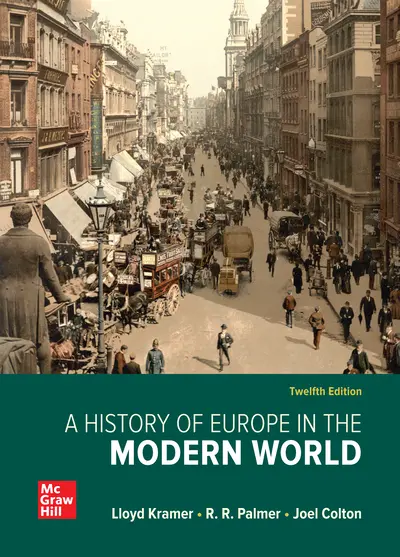My Account Details

ISBN10: 1259922499 | ISBN13: 9781259922497

* The estimated amount of time this product will be on the market is based on a number of factors, including faculty input to instructional design and the prior revision cycle and updates to academic research-which typically results in a revision cycle ranging from every two to four years for this product. Pricing subject to change at any time.
Instructor Information
Quick Actions (Only for Validated Instructor Accounts):
A History of Europe in the Modern World delves into how Europe's history has contributed to the development of the modern world and an increasingly global society. The twelfth edition of this classic text links specific nations, movements, and landmark events in European history to broader historical themes and problems that have shaped the contemporary era. Readers of this text will learn about Europe's past within the context of key historical trends, including the rise of industry and a global economy; the development of science, technology, and new forms of knowledge; social, cultural, and political movements; evolving views of human rights; and the complex relations between European nations and the wider world.
CHAPTER 1: The Rise of Europe
CHAPTER 2: The Upheaval in Western Christendom, 1300 - 1560
CHAPTER 3: The Atlantic World, Commerce, and Wars of Religion, 1560 - 1648
CHAPTER 4: The Growing Power of Western Europe, 1640 - 1715
CHAPTER 5: The Transformation of Eastern Europe, 1648 - 1740
CHAPTER 6: The Scientific View of the World
CHAPTER 7: The Global Struggle for Wealth and Empire
CHAPTER 8: The Age of Enlightenment
CHAPTER 9: The French Revolution
CHAPTER 10: Napoleonic Europe
CHAPTER 11: Industries, Ideas, and the Struggle for Reform, 1815 - 1848
CHAPTER 12: Revolutions and the Reimposition of Order, 1848 - 1870
CHAPTER 13: The Consolidation of Large Nation-States, 1859 - 1871
CHAPTER 14: Europe's Economic and Political Ascendancy, 1871 - 1914
CHAPTER 15: European Society and Culture, 1871 - 1914
CHAPTER 16: Europe’s Colonial Empires and Global Dominance, 1871 - 1914
CHAPTER 17: The First World War
CHAPTER 18: The Russian Revolution and the Emergence of the Soviet Union
CHAPTER 19: Democracy, Anti-Imperialism, and the Economic Crisis after the First World War
CHAPTER 20: Democracy and Dictatorship in the 1930s
CHAPTER 21: The Second World War
CHAPTER 22: The Cold War and Reconstruction after the Second World War
CHAPTER 23: Decolonization and the Breakup of the European Empires
CHAPTER 24: Coexistence, Confrontation, and the New European Economy
CHAPTER 25: The International Revolt against Soviet Communism
CHAPTER 26: Europe and the Changing Modern World
Accessibility
Creating accessible products is a priority for McGraw Hill. We make accessibility and adhering to WCAG AA guidelines a part of our day-to-day development efforts and product roadmaps.
For more information, visit our accessibility page, or contact us at accessibility@mheducation.com
Need support? We're here to help - Get real-world support and resources every step of the way.